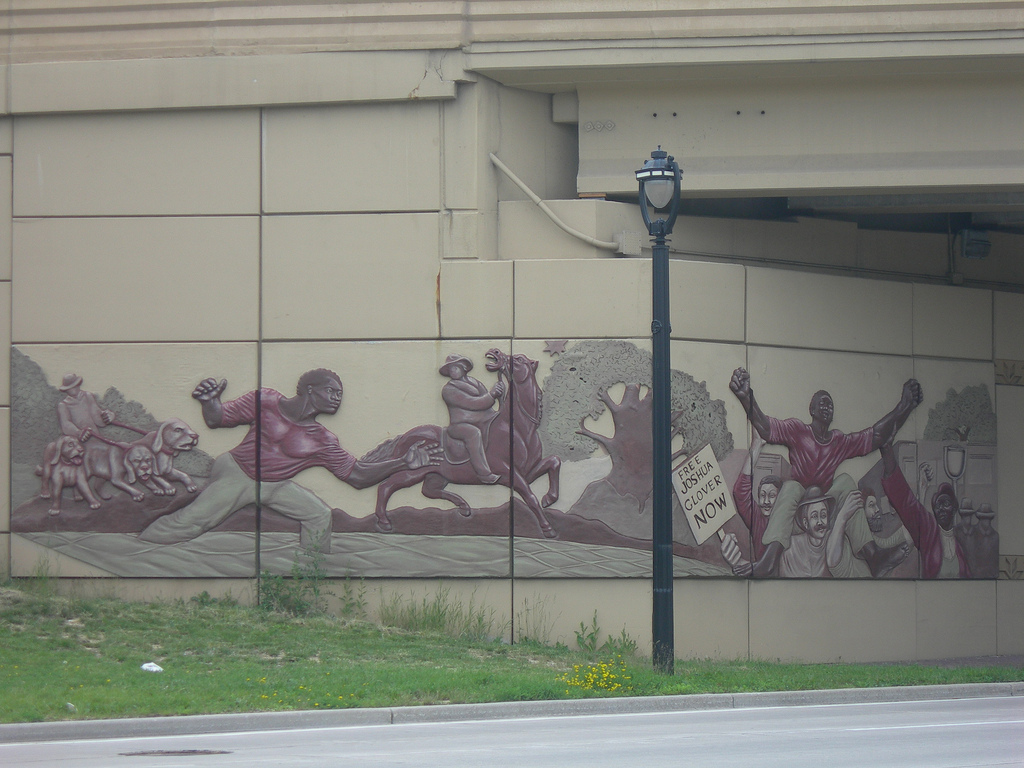Joshua Glover was an escaped Missouri slave. In 1852 he settled in Racine working at a nearby sawmill. On the night of March 10, 1854, a posse consisting of two federal marshals, Glover’s former master (Benammi Garland), and four other men broke into his home and arrested him under the authority of the Fugitive Slave Act. Fearing that Glover could not be successfully detained in the abolitionist enclave of Racine (while awaiting final disposition by a federal judge), the marshals brought him to the Milwaukee County jail. Glover’s friends and local sympathizers informed Milwaukee abolitionist and newspaper editor Sherman Booth who together with abolitionist attorneys made unsuccessful legal attempts to free Glover. At the same time, these individuals aroused the passions of a crowd (whose size swelled to roughly five thousand people) outside the county court house to protest Glover’s capture. On the evening of March 11, the mob forcibly entered the jail, freed Glover, and took him to a safe house in Waukesha. His flight eventually took him to Canada and freedom.[1]
For his role in Glover’s rescue, Booth was convicted in federal court, but the Wisconsin Supreme Court ordered his release on the grounds that the Fugitive Slave Act was unconstitutional. (Earlier it had issued a writ of habeas corpus releasing Booth from federal custody on the same grounds.) In Ableman v. Booth (1859), the U.S. Supreme Court unanimously held that state courts cannot nullify the decisions of federal courts, overturned the state court’s rulings, and affirmed the constitutionality of the Fugitive Slave Act.[2]
The Glover incident, occurring at the same time that Congress was debating the fateful Kansas-Nebraska bill—which, when enacted, opened up those territories on the basis of popular sovereignty—played a key role in heightening antislavery sentiment in the state and in the formation of the Republican party in Wisconsin. These legal battles gave the party a “states’ rights” dimension that broadened its appeal. What had been a marginally Democratic state at the beginning of the 1850s became solidly Republican by decade’s end.
Footnotes [+]
- ^ H. Robert Baker, The Rescue of Joshua Glover (Athens, OH: Ohio University Press, 2006), 1-3, 5-10, 17-23; Michael J. McManus, Political Abolitionism in Wisconsin (Kent, OH: Kent State University Press, 1998), 87-88; Ruby West Jackson and Walter T. McDonald, “Finding Freedom,” Wisconsin Magazine of History 90 no. 33 (Spring 2007): 49-52.
- ^ McManus, Political Abolitionism in Wisconsin, 133-138, 173-174; Ableman v. Booth, 62 U.S. 506; Baker, The Rescue of Joshua Glover, 80-81, 84-109 passim, 138, 154-155.
For Further Reading
Baker, H. Robert, The Rescue of Joshua Glover: A Fugitive Slave, the Constitution, and the Coming of the Civil War (Athens, OH: Ohio University Press, 2006).
Jackson, Ruby West, and Walter T. McDonald. “Finding Freedom: The Untold Story of Joshua Glover, Runaway Slave,” Wisconsin Magazine of History 90, no. 3 (Spring 2007), 48-52.
McManus, Michael J. Political Abolitionism in Wisconsin, 1840-1861 (Kent, OH: Kent State University Press, 1998).

0 Comments
Please keep your community civil. All comments must follow the Encyclopedia of Milwaukee Community rules and terms of use, and will be moderated prior to posting. Encyclopedia of Milwaukee reserves the right to use the comments we receive, in whole or in part, and to use the commenter's name and location, in any medium. See also the Copyright, Privacy, and Terms & Conditions.
Have a suggestion for a new topic? Please use the Site Contact Form.